
Congressional Response Report
Issuance of Social Security
Statements
A-03-18-50724 | February 2019

WEB: OIG.SSA.GOV | FACEBOOK: OIGSSA | TWITTER: @THESSAOIG | YOUTUBE: THESSAOIG
6401
SECURITY BOULEVARD | BALTIMORE, MD 21235-0001
February 14, 2019
The Honorable Tom Reed
Ranking Member, Subcommittee on Social Security
Committee on Ways and Means
House of Representatives
Washington, DC 20515
Dear Mr. Reed:
In a June 12, 2018 letter, Sam Johnson, former Chairman, and Representative Vern Buchanan
asked that we review how the Social Security Administration (SSA) mails Social Security
Statements and who receives them.
My office is committed to combating fraud, waste, and abuse in SSA’s operations and programs.
The report highlights various facts pertaining to the issues raised in their letter. To ensure SSA is
aware of the information provided to your office, we are forwarding a copy of this report to the
Agency.
If you have any questions concerning this matter, please call me or have your staff contact
Walter Bayer, Congressional and Intragovernmental Liaison, at (202) 358-6319.
Sincerely,
Gail S. Ennis
Inspector General
Enclosure
cc:
Commissioner of Social Security

WEB: OIG.SSA.GOV | FACEBOOK: OIGSSA | TWITTER: @THESSAOIG | YOUTUBE: THESSAOIG
6401
SECURITY BOULEVARD | BALTIMORE, MD 21235-0001
February 14, 2019
The Honorable Vern Buchanan
House of Representatives
Washington, DC 20515
Dear Mr. Buchanan:
In a June 12, 2018 letter, you and Sam Johnson, former Chairman, Subcommittee on Social
Security, Committee on Ways and Means, asked that we review how the Social Security
Administration (SSA) mails Social Security Statements and who receives them.
My office is committed to combating fraud, waste, and abuse in SSA’s operations and programs.
Thank you for bringing your concerns to the attention of the Office of the Inspector General.
The report highlights various facts pertaining to the issues raised in your letter. To ensure SSA is
aware of the information provided to your office, we are forwarding a copy of this report to the
Agency.
If you have any questions concerning this matter, please call me or have your staff contact
Walter Bayer, Congressional and Intragovernmental Liaison, at (202) 358-6319.
Sincerely,
Gail S. Ennis
Inspector General
Enclosure
cc:
Commissioner of Social Security

Issuance of Social Security Statements
A-03-18-50724
February 2019 Office of Audit Report Summary
Objective
To answer congressional questions
about the Social Security
Administration’s (SSA) issuance of
Social Security Statements.
Background
SSA provides Social Security
Statements (Statement) to individuals
who worked under the Social Security
program. The Statement includes
information about the individual’s
reported earnings and future Social
Security benefits for the individual and
his/her family. Section 1143 of the
Social Security Act requires that SSA
send Statements to individuals who are
age 25 and older, who are not
receiving Social Security benefits
based on their own earnings records,
and for whom the Agency can obtain
current addresses. SSA mails the
Statement about 3 months before the
individual’s birthday.
In May 2012, SSA implemented
my Social Security, an online account
where registered users can access their
Statements online at any time. As of
Fiscal Year (FY) 2018, there were
about 38.8 million registered users of
my Social Security. Because registered
users can access their Statements
anytime via my Social Security, SSA
excludes them from receiving
automatic Statements.
Results of Review
In FYs 2010 to 2018, SSA mailed approximately 381 million paper
Statements (both automatic and on request). The Agency mailed
about 252 million paper Statements in FYs 2010 to 2013 primarily
to individuals who were age 25 and older and not receiving Social
Security benefits. Between FYs 2014 and 2018, citing budgetary
issues, the Agency reduced the number of paper Statements by
modifying the age groups to whom SSA mailed Statements. This
resulted in the Agency mailing only about 129 million paper
Statements during this time period.
Moreover, the number of individuals who accessed their Statements
online via my Social Security increased every year, ranging from
1.9 million in FY 2012 to 16.8 million in FY 2018. However, the
percentage of registered my Social Security users who accessed
their Statements online declined annually from 96 percent in
FY 2012 to 43 percent in FY 2018.
The costs for printing and mailing paper Statements decreased from
FY 2010 to 2018 because the Agency changed the age groups to
whom it mailed paper Statements. In FY 2010, SSA spent about
$65 million to print and mail approximately 155 million
Statements, and, in FY 2018, the Agency spent about $7.6 million
to print and mail about 14.6 million Statements.
Finally, the contract awarded to print and mail paper Statements
allowed the Agency to vary the number of Statements mailed
annually. The 5-year contract, scheduled to expire in August 2019,
estimated the Agency would order 45 million Statements annually.
However, it allowed for a 25-percent increase or decrease in
Statements to allow flexibility if SSA decided to modify the age
groups to whom it mailed Statements and avoid re-soliciting the
contract.

Issuance of Social Security Statements (A-03-18-50724)
TABLE OF CONTENTS
Objective ..........................................................................................................................................1
Background ......................................................................................................................................1
Results of Review ............................................................................................................................3
Issuance of Paper Social Security Statements ...........................................................................3
FYs 2010 to 2013 .................................................................................................................4
FYs 2014 to 2018 .................................................................................................................5
Issuance of Online Social Security Statements ..........................................................................6
Cost of Issuing Social Security Statements ...............................................................................7
Printing Contract for Social Security Statements ......................................................................8
Conclusions ......................................................................................................................................9
Agency Comments ...........................................................................................................................9
– Example Social Security Statement .................................................................... A-1
– Congressional Request Letter ............................................................................. B-1
– Scope and Methodology ..................................................................................... C-1
– Agency Comments .............................................................................................. D-1

Issuance of Social Security Statements (A-03-18-50724)
ABBREVIATIONS
Form SSA-7004-SM-OP1 Request for an Earnings and Benefit Estimate Statement
Form SSA-7005-SM-SI Social Security Statement
FY Fiscal Year
OIG Office of the Inspector General
SSA Social Security Administration
Statement Social Security Statement
U.S.C. United States Code

Issuance of Social Security Statements (A-03-18-50724) 1
OBJECTIVE
Our objective was to answer congressional questions about the Social Security Administration’s
(SSA) Social Security Statements.
BACKGROUND
Section 1143 of the Social Security Act,
1
as amended, requires that SSA provide a Social Security
Statement (Statement)
2
annually, without request, to all individuals age 25 and older who are not
receiving Social Security benefits based on their own earning records and for whom SSA can
determine current mailing addresses.
3
The purpose of the Statement is threefold: inform
individuals about their Social Security benefits, help individuals plan for their financial futures,
and ensure individuals’ earnings records are accurate.
4
The Statement provides each worker
an estimate of the monthly retirement benefit the worker would receive at full retirement age,
age 70, and age 62;
an estimate of the amount of monthly disability benefit the worker could receive should
he/she become disabled;
an estimate of the monthly benefit the worker’s family could receive should the worker die;
a year-by-year display of the worker’s earnings that have been reported to Social Security;
and
a total of the Social Security taxes paid by the worker and his/her employer(s) over the
worker’s career.
5
1
Social Security Act, 42. U.S.C § 1320b-13.
2
Social Security Statement, (Form SSA-7005-SM-SI).
3
SSA obtains addresses for automatic Statements from the Internal Revenue Service’s taxpayer Individual Master
File and revenue agencies in Puerto Rico and the Virgin Islands for individuals living in those locations who have
not filed Federal tax returns.
4
Social Security Statement (Form SSA-7005-SM-SI).
5
See Appendix A for an example of the Statement. In 2006, SSA also began sending automatic Statements to
individuals who had only non-covered earnings. The Statement highlights information about the Windfall
Elimination Provision and Government Person Offset, which reduce benefits for individuals or their dependents
whose work histories include jobs for which they were entitled to pensions and were not subject to Social Security
payroll taxes.

Issuance of Social Security Statements (A-03-18-50724) 2
Since August 1988, SSA has provided statements of recorded earnings and estimates of Social
Security benefits to Social Security numberholders upon request.
6
In Fiscal Year (FY) 1995,
SSA started issuing automatic Statements to eligible individuals age 60 and older and continued
these mailings until FY 1999. In FY 2000, SSA expanded the program to all individuals age 25
and older and began mailing the annual automatic Statements to eligible individuals about
3 months before their birthdays. The automatic Statement does not affect a worker’s right to
request a Statement at any time. SSA provides the information on Statements to a commercial
contractor which prints and mails automatic Statements.
7
The on-request Statements are printed
and mailed by SSA’s print-mail facility.
In May 2012, SSA implemented my Social Security, an online account where registered users
can access important information and SSA services at any time. To establish a
my Social Security account, an individual must be at least age 18 and have a valid email address,
Social Security number, and U.S. mailing address. As of FY 2018, there were about 38.8 million
registered my Social Security users. Because registered users can access their Statements
anytime via my Social Security, SSA excludes them from receiving automatic Statements by
mail even if they never accessed the Statement online. When my Social Security was
implemented in May 2012, customers were given an option to receive paper Statements.
However, this delivery preference was eliminated in September 2012. Therefore, anyone who
signed up after September 2012 does not receive paper Statements.
On June 12, 2018, Sam Johnson, former Chairman, and Vern Buchanan, former Member,
Subcommittee on Social Security, requested that we review how SSA mails Statements and who
receives them, see Appendix B. Specifically, they requested we determine the following.
1. Between FYs 2014 and 2018, how many Statements were mailed and what were the costs
each fiscal year?
2. Since resuming mailings in September 2014, when has SSA stopped or changed who
receives a mailed Statement? Please provide the rationale for the changes and include over
what periods they occurred, who was affected, and how SSA communicated them.
3. Did people, who were due to receive a Statement during that time, receive one when mailings
resumed or were they skipped?
4. What is the current printing contract’s period of performance and how does the contract
address changes or stoppages? What is SSA’s plan for a new contract?
6
These Statements were mailed as a result of individuals completing a paper Request for an Earnings and Benefit
Estimate Statement, (Form SSA-7004-SM-OP1) or a similar form through SSA’s Website.
7
The contractor employees are subject to suitability background checks.

Issuance of Social Security Statements (A-03-18-50724) 3
RESULTS OF REVIEW
In FYs 2010 to 2018, SSA mailed approximately 381 million paper Statements (both automatic
and on request). The Agency mailed about 252 million paper Statements in FYs 2010 to 2013
primarily to individuals who were age 25 and older and not receiving Social Security benefits.
Between FYs 2014 and 2018, citing budgetary issues, the Agency reduced the number of paper
Statements by modifying the age groups to whom it mailed the Statements. This reduction
resulted in the Agency mailing only about 129 million paper Statements.
Moreover, the number of individuals who accessed their Statements via my Social Security
increased from 1.9 million in FY 2012 to 16.8 million in FY 2018. However, the percentage of
registered my Social Security users who accessed their Statements online declined from
96 percent in FY 2012 to 43 percent in FY 2018.
The costs of printing and mailing paper Statements decreased from FY 2010 to FY 2018 because
SSA changed the age groups to whom it mailed paper Statements and Statements were available
online. In FYs 2010 to 2018, SSA spent about $174 million to mail 381 million paper
Statements. In FY 2010, it cost about $65 million to mail approximately 155 million Statements,
and, in FY 2018, it cost $7.6 million to mail about 14.6 million Statements.
Finally, the contract SSA awarded to print and mail the paper Statements allows the number of
Statements mailed annually to fluctuate. The 5-year contract, which is scheduled to expire in
August 2019, estimates 45 million Statements will be mailed annually. However, it allows for a
25-percent increase or decrease in Statements to allow flexibility if SSA modifies the age groups
to whom it mails Statements and avoid re-soliciting the contract.
Issuance of Paper Social Security Statements
As shown in Table 1, from FYs 2010 to 2018, SSA printed and mailed approximately
381 million paper Statements to individuals to inform them about their lifetime earnings and
future benefits. During these 9 years, the Agency mailed about 379 million automatic
Statements to individuals. Additionally, it mailed approximately 2 million Statements to
individuals upon request.
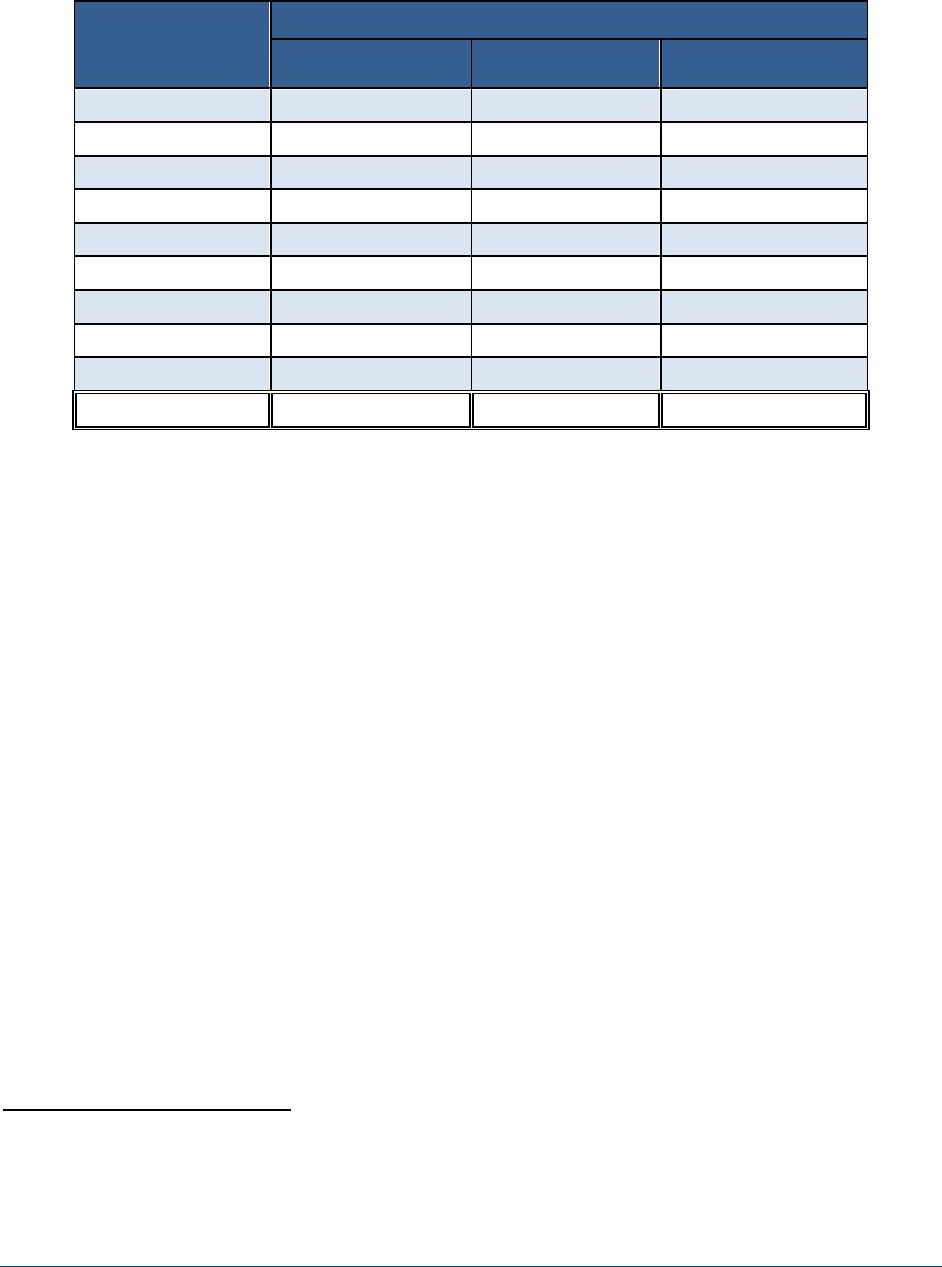
Issuance of Social Security Statements (A-03-18-50724) 4
Table 1: The Volume of Social Security Statements Mailed
Fiscal Year
Number of Statements Mailed
Automatic
1
On-request
2
Total
2010
154,707,312
392,250
155,099,562
2011
74,427,249
268,060
74,695,309
2012
21,728,005
15,406
21,743,411
2013
-
7,608
7,608
2014
3,868,569
74,293
3,942,862
2015
49,577,044
515,026
50,092,070
2016
46,728,830
384,746
47,113,576
2017
13,285,401
115,617
13,401,018
2018
14,428,893
139,239
14,568,132
Total
378,751,303
1,912,245
380,663,548
Note 1: Mailed to individuals based on the Agency’s criteria.
Note 2: Mailed when individuals completed a Form SSA-7004-SM-OP1 or a similar form through SSA’s
Website.
FYs 2010 to 2013
In FY 2010, the Agency mailed about 155 million automatic Statements to individuals age 25
and older, not receiving Social Security benefits, and for whom SSA could determine mailing
addresses. This was the last year SSA mailed Statements in accordance with Section 1143 of the
Social Security Act. SSA suspended automatically mailing Statements in FY 2011 but mailed
about 75 million Statements to individuals during the first half of the FY. In March 2011, the
Commissioner of SSA notified Congress that, to conserve funds, the Agency was suspending
mailing Statements.
8
During that year, the Agency received about $1 billion less in funding than
it requested in the President’s budget. In FY 2012, citing budgetary issues, SSA continued
curtailing mailing automatic Statements, mailing about 22 million Statements. From February to
August 2012, the Agency mailed Statements to individuals age 60 and older, and, from July to
September 2012, it mailed Statements to individuals age 25 and older. In May 2012, SSA began
providing online access to Statements when it implemented my Social Security. SSA ceased
mailing automatic Statements in FY 2013, again citing budgetary issues.
8
Department of Labor, Health and Human Services, Education, and Related Agencies Appropriations for Fiscal
Year 2012: Hearing on Senate Bill S1599 Before the Subcommittee of the Committee on Appropriations, 112
th
Congress p. 11 (2011).

Issuance of Social Security Statements (A-03-18-50724) 5
FYs 2014 to 2018
In March 2014, SSA notified Congress that it would resume mailing automatic Statements to
individuals in September 2014.
9
SSA mailed about 3.9 million automatic Statements to
individuals who attained ages 25, 30, 35, 40, 45, 50, 55, and 60 by December 2014;
10
were not
receiving Social Security benefits; and did not have my Social Security accounts. According to
SSA, it stopped mailing Statements in accordance with section 1143 of the Social Security Act to
effectively use its resources to preserve the most critical commitments to public service. Further,
the Agency stated that mailing Statements to individuals using 5-year increments would ensure
everyone would receive an automatic Statement at least once every 5 years or more often if a
person requests one. In September 2014, the Agency notified the public about the change.
11
SSA did not mail Statements retroactively to those individuals who met the revised criteria
before September 2014. In FYs 2015 and 2016, SSA continued mailing automatic Statements to
individuals in 5-year increments, mailing approximately 49.6 million in FY 2015 and
46.7 million in FY 2016. Issuing Statements based on 5-year increments resulted in SSA
mailing about one-third of the Statements it mailed in FY 2010.
In the first quarter of FY 2017, SSA continued mailing Statements to individuals based on 5-year
increments, but, in January 2017, the Agency revised the criteria to mail automatic Statements to
individuals age 60 and older, not receiving Social Security benefits, and who do not have a
my Social Security account. SSA decided to mail automatic Statements to individuals for whom
the information was most essential, namely those who were near retirement. The change in
criteria resulted in SSA mailing automatic Statements to about 13 million individuals in
FY 2017. Again, the Agency indicated that budgetary considerations were the main reasons for
the reduction and believed it was complying with section 1143 of the Social Security Act because
it
considered the number of statements that would be mailed when constructing the budget,
made Statements available to anyone via my Social Security,
sent a reminder email to my Social Security account holders to check their online Statements,
mailed paper Statements to individuals who requested them, and
determined printing and mailing Statements to everyone required by the statute would
impede other essential work due to budgetary limitations.
9
SSA, Plan to Increase the Number of Individuals Annually Receiving Social Security Statements, Report to
Congress, p. 4 (March 2014).
10
SSA mailed the Statements 3 months before the individuals’ birthdays.
11
SSA, Agency Resumes Mailing Social Security Statements, ssa.gov (September 16, 2014).
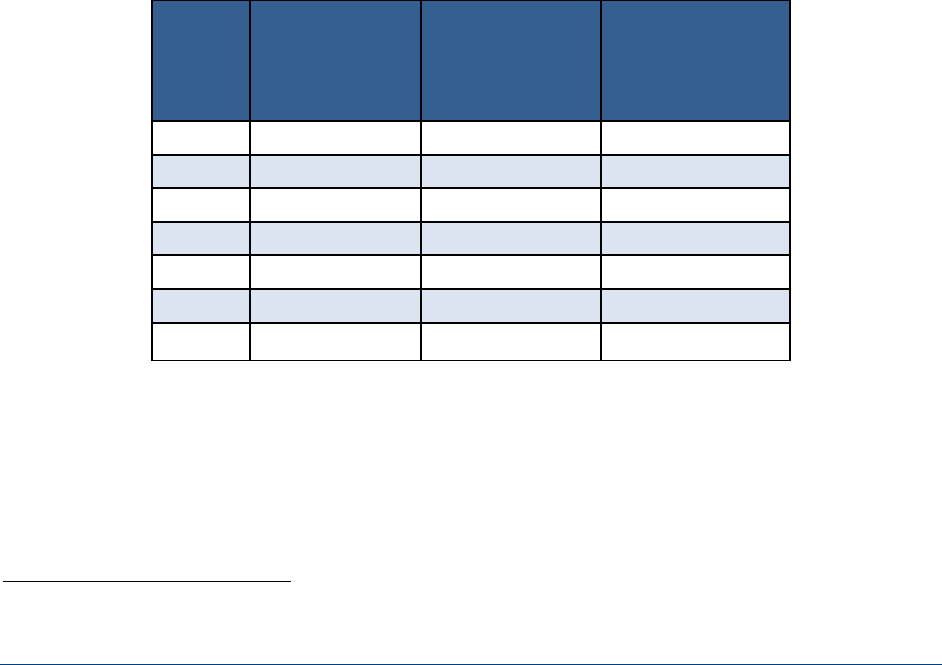
Issuance of Social Security Statements (A-03-18-50724) 6
SSA first notified the public about the reduction in automatically mailing Statements in a
January 2017 blog post.
12
SSA continued mailing automatic Statements to individuals age 60
and older in FY 2018, which resulted in approximately 13.8 million Statements being mailed.
Issuance of Online Social Security Statements
The number of individuals who accessed their online Statements increased from about
1.9 million in FY 2012 to 16.8 million in FY 2018, see Table 2. The my Social Security portal
allows registered users to access their Statements any time at their own convenience.
Furthermore, making Statements accessible online benefits SSA because it reduces traffic to
field offices, calls to the Agency, and costs to print and mail automatic Statements.
When SSA implemented my Social Security in FY 2012, about 1.9 (96 percent) of the 2 million
registered users had accessed their online Statements. At that time, online Statements was the
only service offered via my Social Security, but additional services were added over time, such as
requesting replacement Social Security cards, changing addresses, and obtaining benefit
verification letters. In FY 2018, about 16.8 (43 percent) of the 38.8 million registered users
accessed their online Statements. Although the number of registered users who accessed their
Statements online had increased annually, the percent of registered users who accessed their
Statements had declined from 96 percent in FY 2012 to 43 percent in FY 2018. There could be
several contributing factors, such as individuals accessing other services via my Social Security.
Table 2: Online Statements via my Social Security
FY
Total
Registered
Users
Users Who
Access Online
Statement
Percent of
Users Who
Access Online
Statement
2012
2,023,011
1,945,890
96
2013
8,352,201
7,135,204
85
2014
14,490,379
10,062,404
69
2015
21,139,321
12,776,556
60
2016
26,941,287
14,279,536
53
2017
32,655,922
15,654,742
48
2018
38,812,938 16,849,165 43
As shown in Figure 1, in FY 2012, 38 percent of the individuals who accessed their Statements
online were age 60 and older. This number increased to between 47 and 51 percent in FYs 2013
to 2018. This is the age group SSA targeted with mailing automatic Statements. Further,
stopping automatic Statement mailings to individuals under age 60 did not result in a significant
12
SSA, Finding Value—and my Social Security—in light of Budget Cuts, ssa.gov (January 9, 2017).
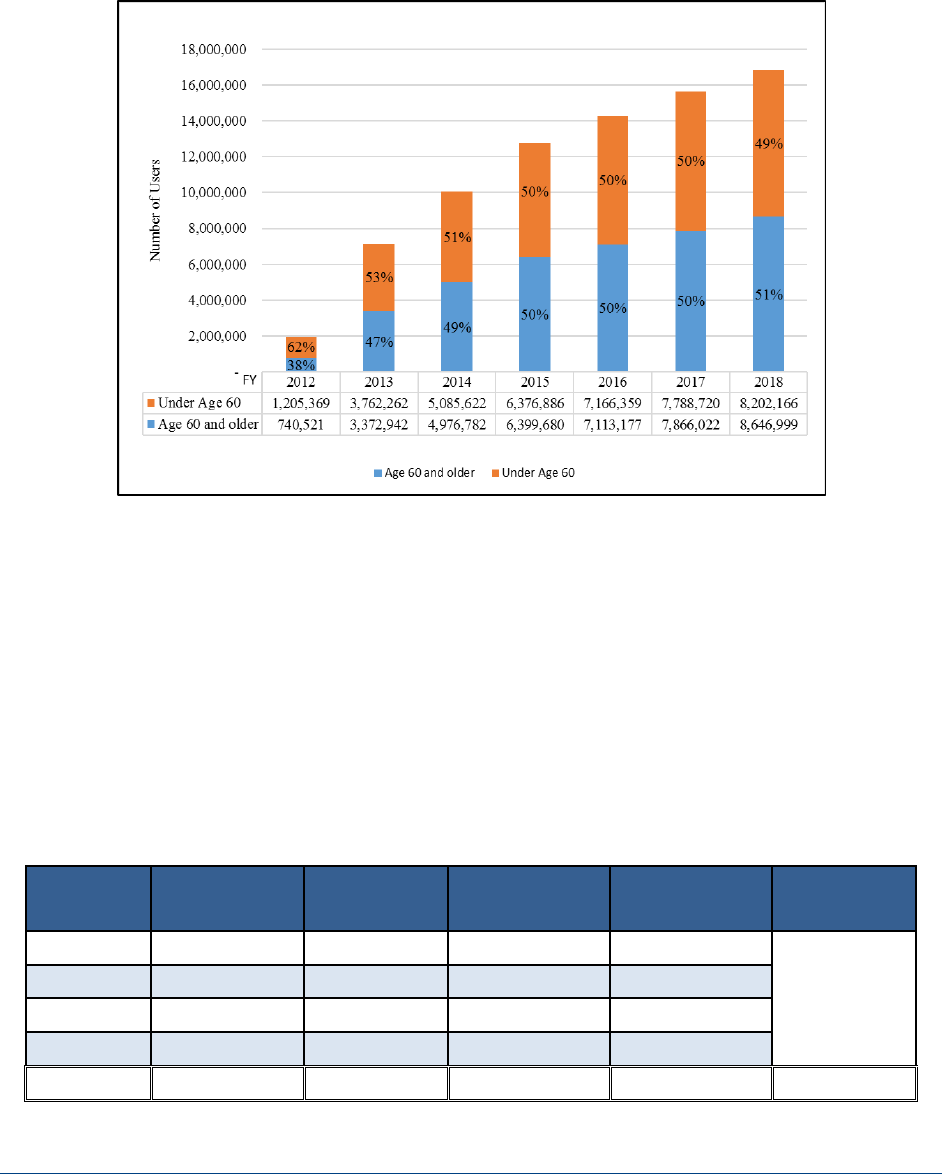
Issuance of Social Security Statements (A-03-18-50724) 7
increase in online Statement access for this group. During FYs 2013 to 2018, their level of
access remained relatively constant from 53 percent in FY 2013 to 49 percent in FY 2018.
Figure 1: Age Demographics of Registered Users Who Access Online Statements
Cost of Issuing Social Security Statements
As shown in Table 3, in FYs 2010 to 2013, SSA spent about $107 million to print and mail
automatic and on-request Statements to approximately 252 million individuals. Specifically,
about $12.9 million related to printing, and $94.3 million related to postage. It cost SSA, on
average, $0.43 to print and mail one Statement during this period. In FY 2010, the last time SSA
mailed Statements in accordance with section 1143 of the Social Security Act, it cost about
$65 million to print and mail approximately 155 million Statements. The cost decreased in
FYs 2011 to 2013, when SSA suspended mailing the automatic Statements, from about
$32 million to $3,500, respectively.
Table 3: Costs of Social Security Statements FYs 2010 to 2013
FY Volume Printing Postage Total
Cost Per
Statement
2010
155,099,562
$7,057,223
$57,541,938
$64,599,161
2011
74,695,309
$4,227,479
$28,309,522
$32,537,001
2012
21,743,411
$1,565,761
$8,458,187
$10,023,948
2013
7,608
$289
$3,196
$3,485
Total
251,545,890
$12,850,752
$94,312,843
$107,163,595
$0.43
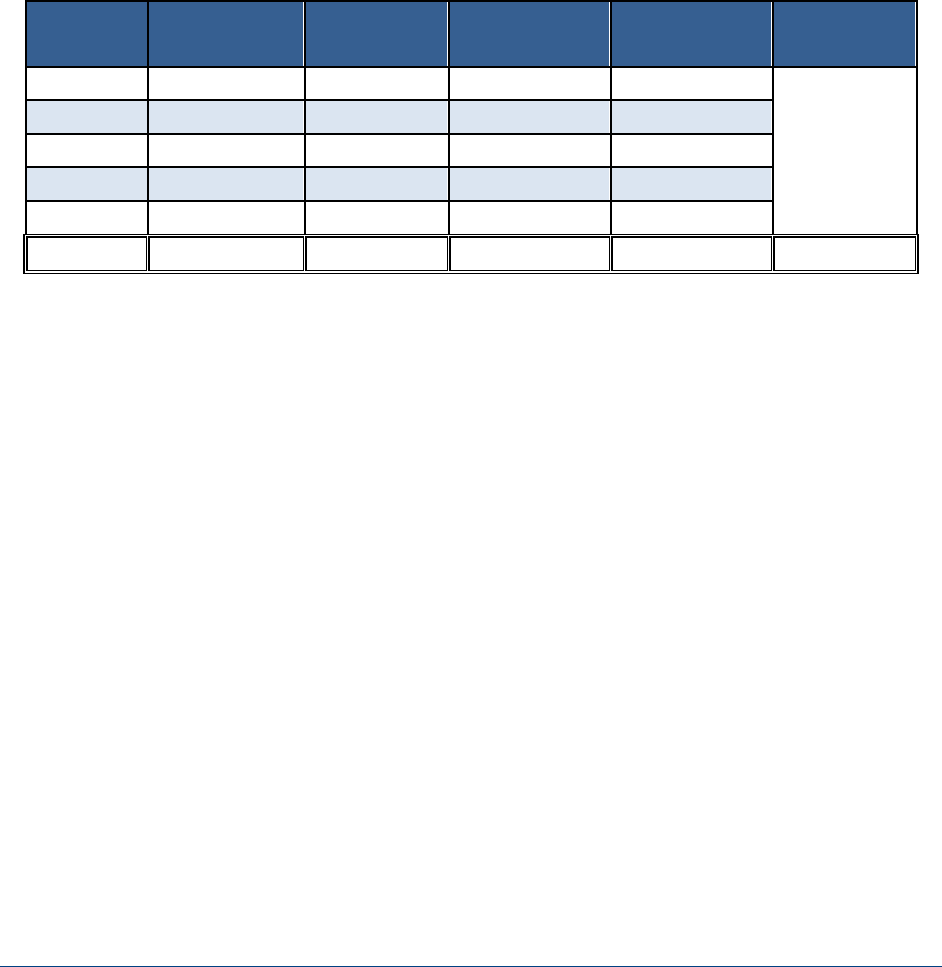
Issuance of Social Security Statements (A-03-18-50724) 8
In FYs 2014 to 2018, the cost of mailing Statements decreased significantly because the Agency
changed its criteria for mailing automatic Statements and online Statements were available.
During the 5-year period, SSA spent about $66.7 million to print and mail approximately
129 million Statements to individuals, see Table 4. About $11.2 million related to printing and
$55.5 million related to postage. It cost SSA, on average, $.52 to print and mail one Statement
during this period. The annual costs ranged from about $2 million in FY 2014, the year SSA
resumed mailing automatic Statements, to approximately $26 million in FY 2015, when SSA
mailed automatic Statements to individuals in 5-year increments. In FY 2018, the year SSA
mailed automatic Statements to individuals age 60 and older who were not registered for
my Social Security, the costs decreased to about $7.6 million.
Table 4: Costs of Social Security Statements FYs 2014 to 2018
FY Volume Printing Postage Total
Cost Per
Statement
2014
3,942,862
$332,124
$1,715,733
$2,047,857
2015
50,092,070
$4,206,031
$21,865,166
$26,071,197
2016
47,113,576
3,989,118
20,033,608
$24,022,726
2017
13,401,018
$1,280,333
$5,670,538
$6,950,871
2018
14,568,132
$1,408,446
$6,172,971
$7,581,417
Total
129,117,658
$11,216,052
$55,458,016
$66,674,068
$0.52
Printing Contract for Social Security Statements
SSA’s printing contract commenced on September 1, 2014 for an initial period ended
August 31, 2015 plus up to four optional 12-month extension periods. The Agency exercised all
option years bringing the contract end date to August 31, 2019. SSA worked with the
Government Publishing Office to procure a “requirements” contract that allows SSA to adjust
the volume of Statements it would produce according to its needs. The requirements clause of
the contract stated that “The quantities of items specified herein are estimates only, and are not
purchased hereby.” Further, it stated, “Except as may be otherwise provided in this contract, if
the Government’s requirements for the items set forth herein do not result in orders in the
amounts or quantities described as ‘estimated,’ it shall not constitute the basis for an equitable
price adjustment under this contract.”
The contract showed an estimated 45 million Statements would be ordered, annually, but
allowed SSA to increase or decrease by up to 25 percent of the total number of Statements
ordered each year. Regarding the variation between estimated volumes, the Agency stated the
contract specifications were developed to ensure SSA would not need to re-solicit a new contract
if it added other age groups to the Statements production, a process that could take
approximately 9 to 12 months to complete. As of January 2019, SSA staff indicated it was
working with the Government Publishing Office to solicit the new contract for printing and
mailing Statements.

Issuance of Social Security Statements (A-03-18-50724) 9
CONCLUSIONS
In FYs 2010 to 2018, SSA mailed approximately 381 million paper Statements to individuals to
inform them about their lifetime earnings and future Social Security benefits. Section 1143 of
the Social Security Act requires that SSA send automatic Statements to individuals age 25 and
older who are not receiving Social Security benefits. However, over the years, SSA has
modified the age groups to whom it sends Statements. In FYs 2014 to 2018, the Agency mailed
workers about 129 million paper Statements. Between FYs 2014 and 2016, SSA mailed
automatic Statements to individuals who attained ages 25, 30, 35, 40, 45, 50, 55, and 60 and
older; were not receiving Social Security benefits; and did not have my Social Security accounts.
In FYs 2017 and 2018, SSA decided to send Statements to individuals age 60 and older for
whom the information was most essential as they were close to retirement.
Moreover, the costs for mailing the paper Statements decreased from FYs 2010 to 2018 because
SSA changed the age groups to whom the Agency mailed Statements. In FY 2010, the Agency
spent about $65 million to print and mail approximately 155 million Statements, and, in
FY 2018, it spent about $7.6 million to print and mail approximately 14.6 million Statements.
Finally, the contract awarded to mail paper Statements allowed SSA to adjust the number of
Statements mailed annually. The contract showed that SSA would order an estimated 45 million
Statements annually but allowed the Agency to increase or decrease the order by up to 25 percent
to allow flexibility in case SSA decided to modify the age groups to whom it would mail
Statements and to avoid re-soliciting the contract.
AGENCY COMMENTS
SSA had no comments on the report; see Appendix D.
Rona Lawson
Assistant Inspector General for Audit

Issuance of Social Security Statements (A-03-18-50724)
APPENDICES
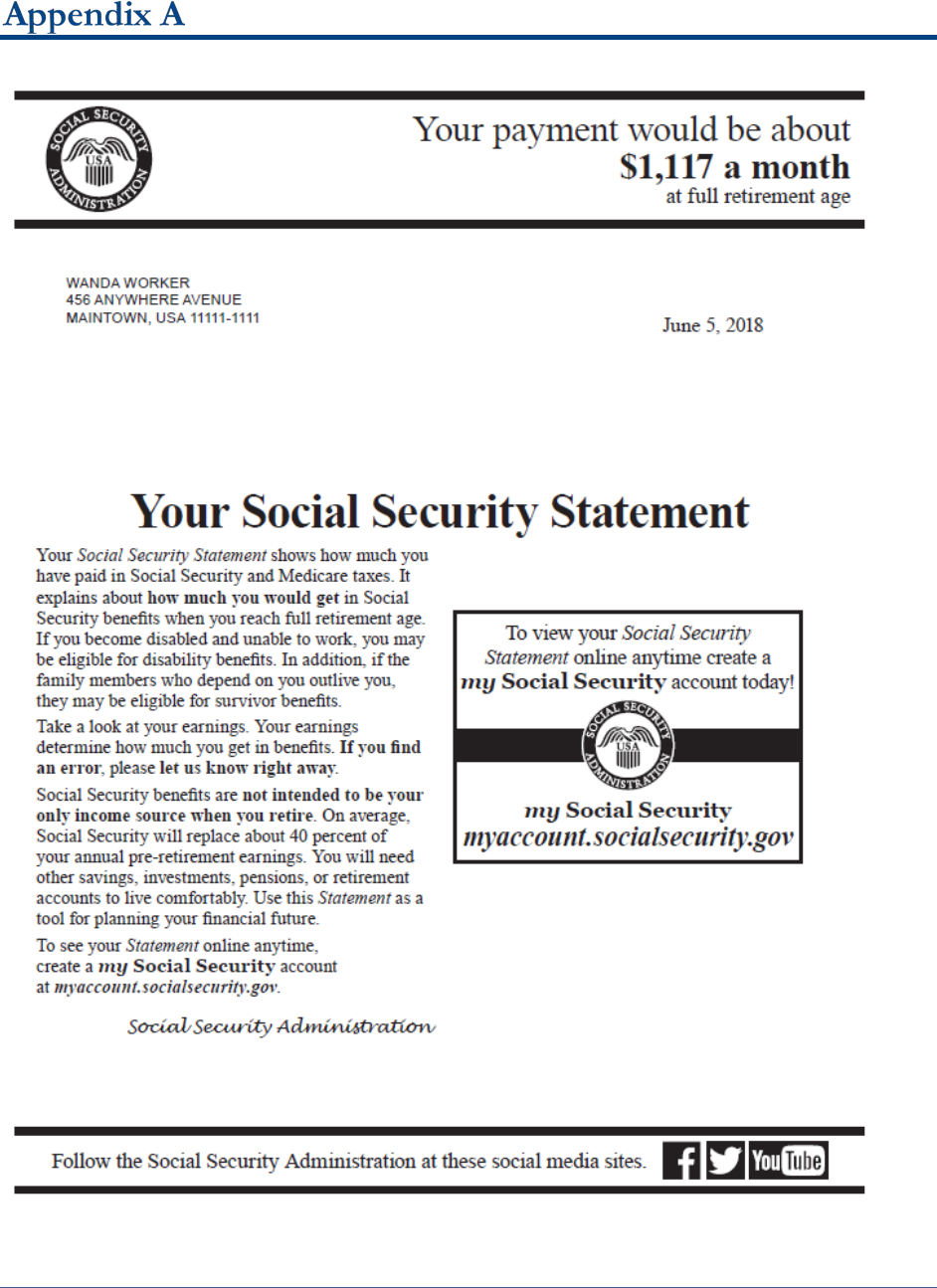
Issuance of Social Security Statements (A-03-18-50724) A-1
– EXAMPLE SOCIAL SECURITY STATEMENT
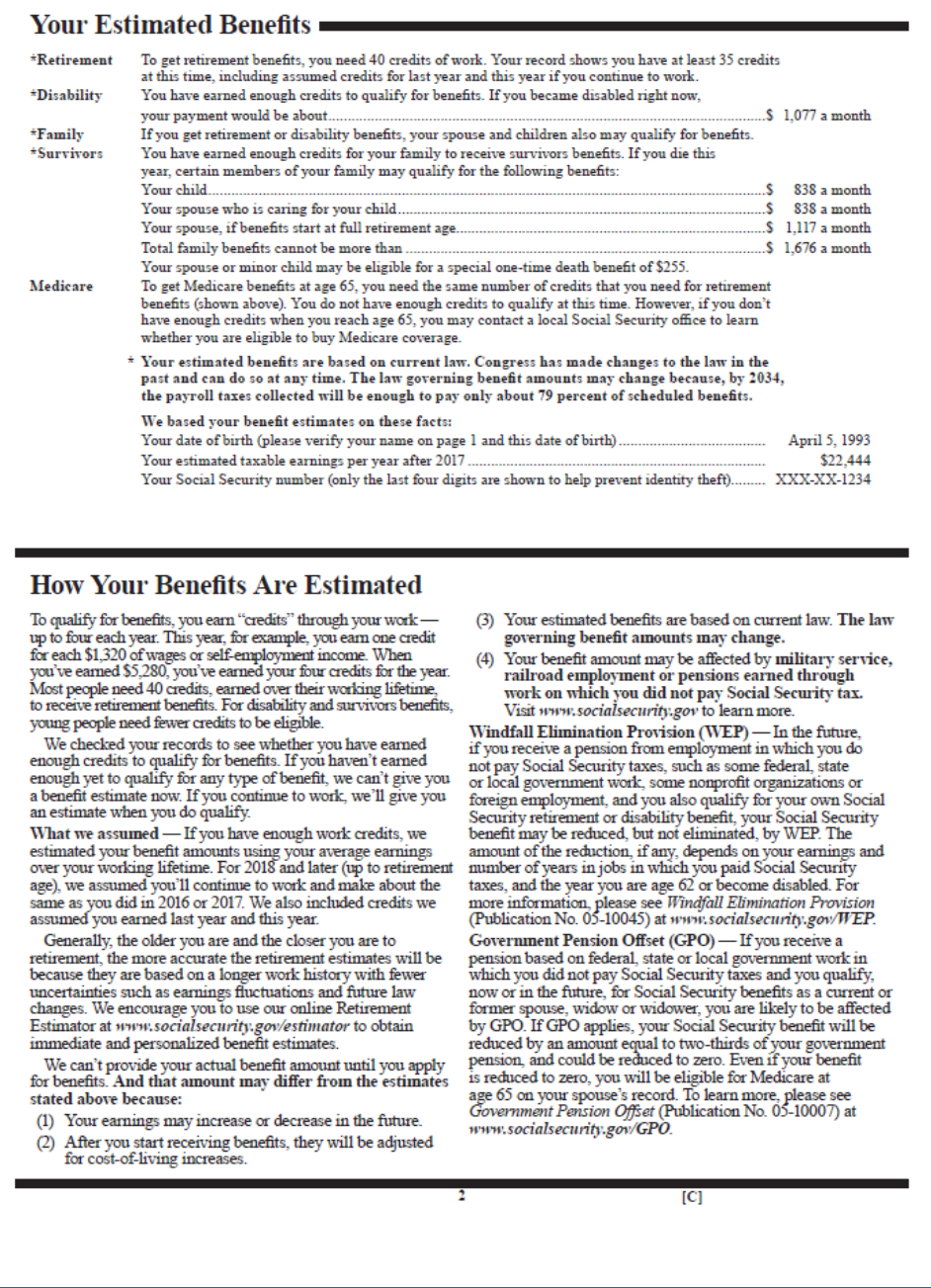
Issuance of Social Security Statements (A-03-18-50724) A-2

Issuance of Social Security Statements (A-03-18-50724) A-3

Issuance of Social Security Statements (A-03-18-50724) A-4
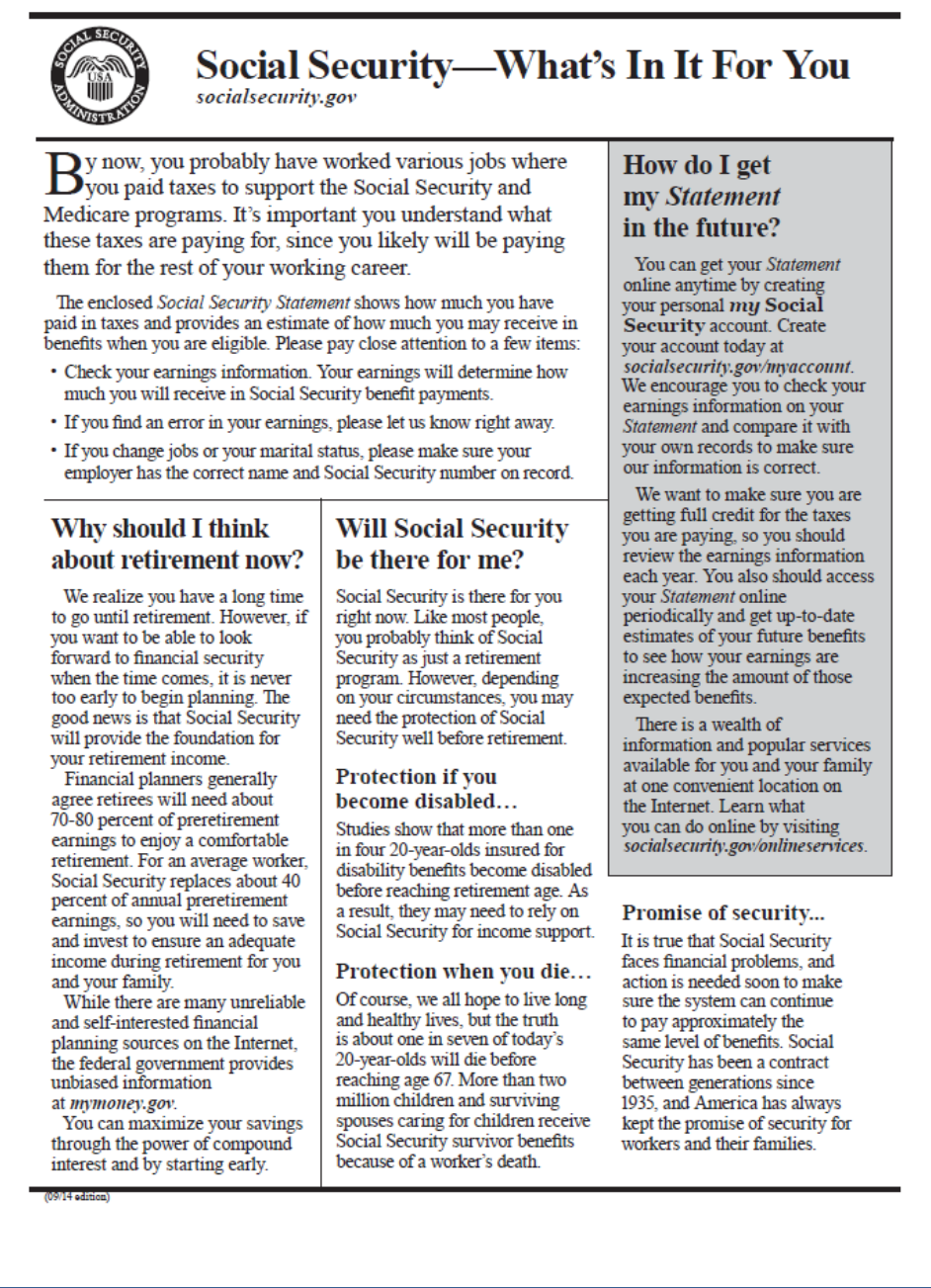
Issuance of Social Security Statements (A-03-18-50724) A-5
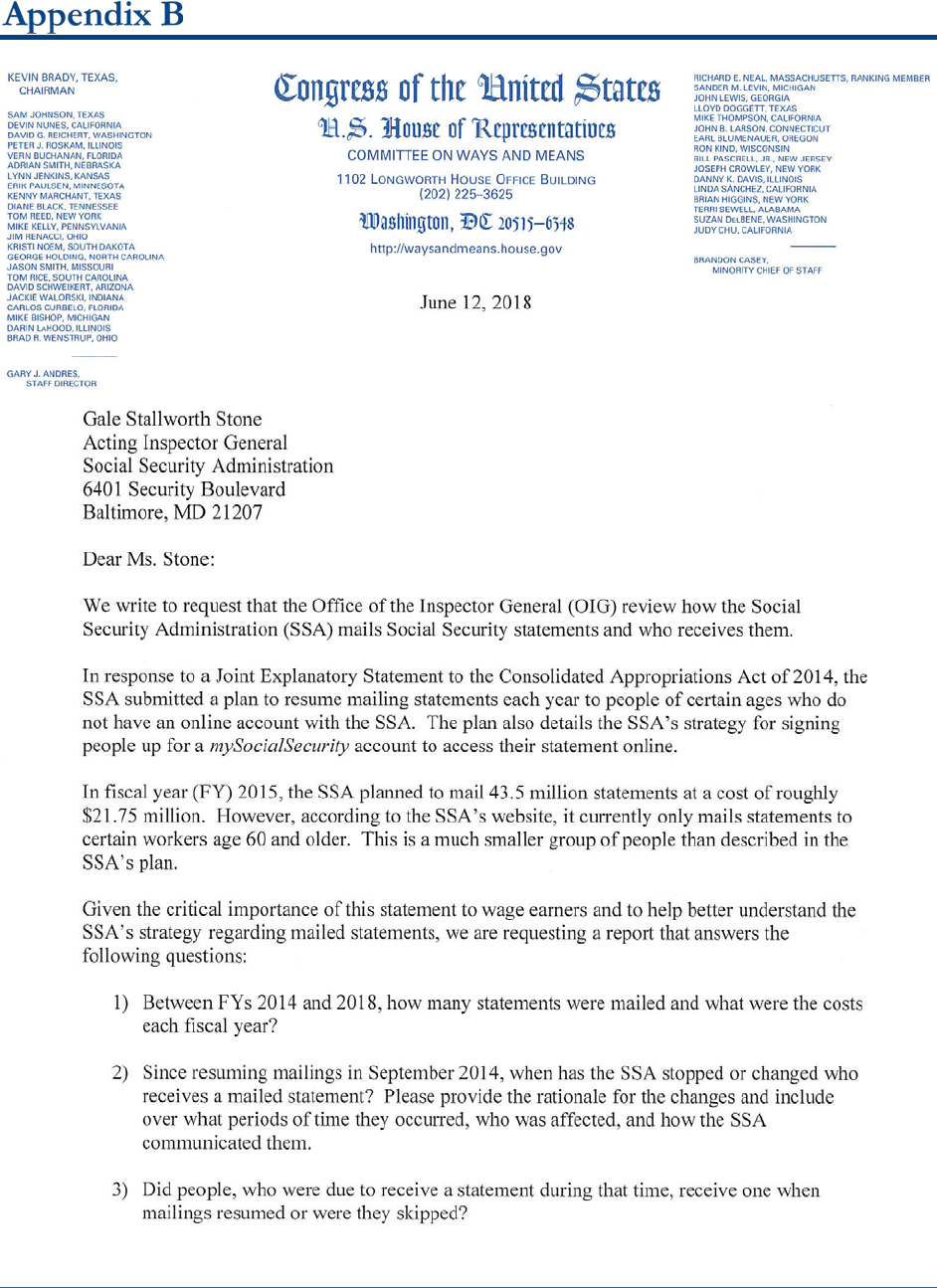
Issuance of Social Security Statements (A-03-18-50724) B-1
– CONGRESSIONAL REQUEST LETTER
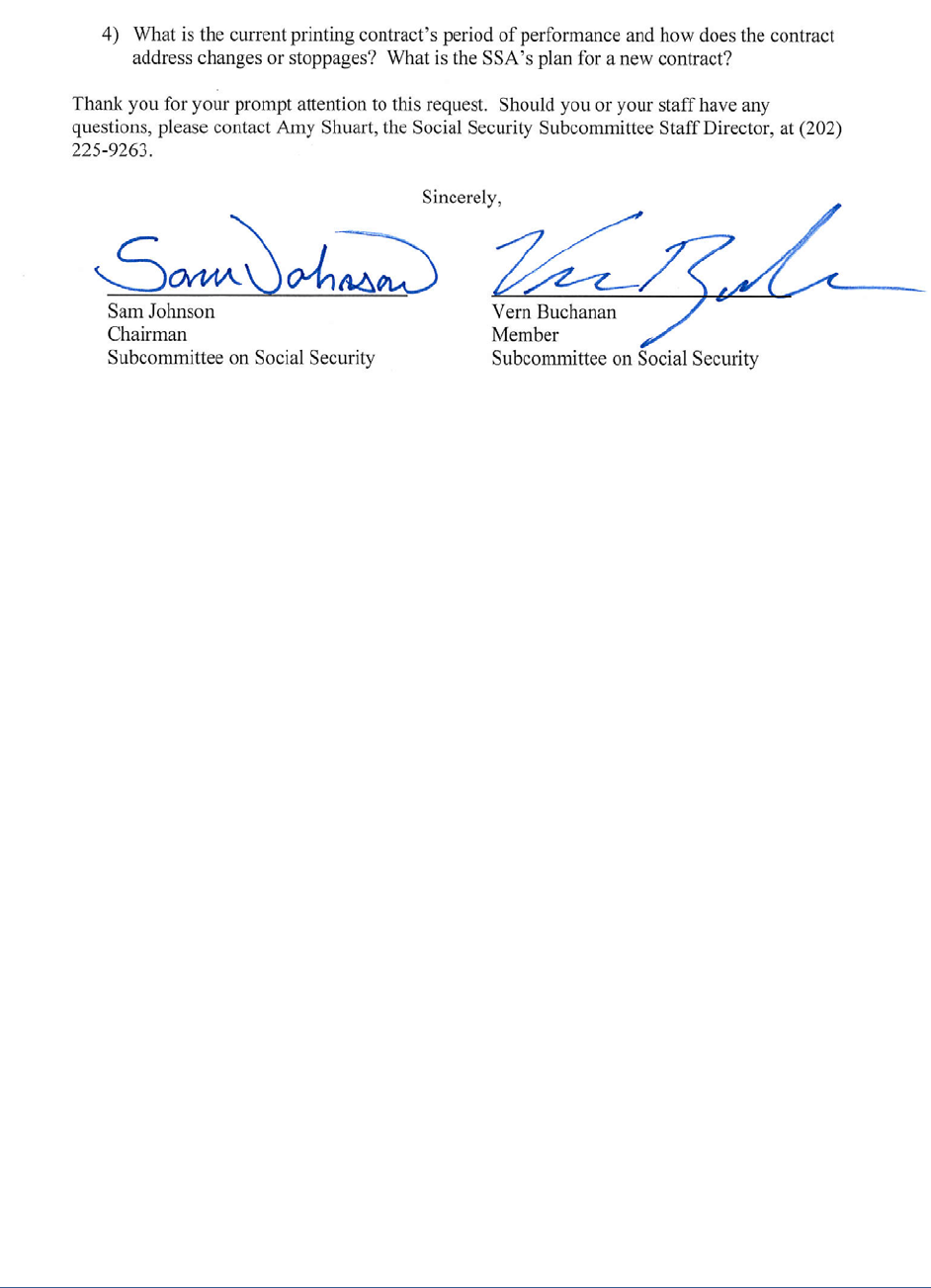
Issuance of Social Security Statements (A-03-18-50724) B-2

Issuance of Social Security Statements (A-03-18-50724) C-1
– SCOPE AND METHODOLOGY
To achieve our objective, we:
Reviewed applicable sections of the Social Security Act and Social Security Administration’s
(SSA) regulations.
Reviewed Public Laws applicable to Social Security Statement (Statement) issuance.
Reviewed applicable sections of SSA’s Program Operations Manual System.
Reviewed prior Office of the Inspector General and Government Accountability Office
reports related to Statements.
Obtained and reviewed management information related the number of Statements mailed,
associated costs of mailing Statements, and printing contracts for Statements.
Reviewed SSA’s Presidential Budget requests and Full Justification of Estimates for
Appropriations, Fiscal Years 2010 to 2018.
Obtained and reviewed demographical information related my Social Security enrollment and
online Statement usage.
Obtained and reviewed publications and media coverage related to Statement mailings and
the availability of the online Statements via my Social Security.
We conducted our review between June and December 2018 in Philadelphia, Pennsylvania. SSA
staff provided all data for this request. Based on our research and analysis, we believe these data
were sufficiently reliable to meet our audit objective. The principal entity reviewed was SSA’s
Office of Systems. We conducted this audit in accordance with generally accepted government
auditing standards. Those standards require that we plan and perform the audit to obtain
sufficient, appropriate evidence to provide a reasonable basis for findings and conclusions based
on our audit objectives. We believe that the evidence obtained provides a reasonable basis for
our findings and conclusions based on our audit objectives.

Issuance of Social Security Statements (A-03-18-50724) D-1
– AGENCY COMMENTS
SOCIAL SECURITY
MEMORANDUM
Date:
February 11, 2019 Refer To: S1J-3
To:
Rona Lawson
Assistant Inspector General for Audit
From:
Stephanie Hall
Acting Deputy Chief of Staff
Subject:
Office of the Inspector General Draft Congressional Response Report, “Issuance of Social
Security Statements” (A-03-18-50724) -- INFORMATION
Thank you for the opportunity to review the draft report regarding our issuance of Social
Security Statements. We have no comments.
Please let me know if we can be of further assistance. You may direct staff inquiries to
Trae Sommer at (410) 965-9102.

MISSION
By conducting independent and objective audits, evaluations, and investigations, the Office of
the Inspector General (OIG) inspires public confidence in the integrity and security of the Social
Security Administration’s (SSA) programs and operations and protects them against fraud,
waste, and abuse. We provide timely, useful, and reliable information and advice to
Administration officials, Congress, and the public.
CONNECT WITH US
The OIG Website (https://oig.ssa.gov/) gives you access to a wealth of information about OIG.
On our Website, you can report fraud as well as find the following.
• OIG news
• audit reports
• investigative summaries
• Semiannual Reports to Congress
• fraud advisories
• press releases
• congressional testimony
• an interactive blog, “
Beyond The
Numbers” where we welcome your
comments
In addition, we provide these avenues of
communication through our social media
channels.
Watch us on YouTube
Like us on Facebook
Follow us on Twitter
Subscribe to our RSS feeds or email updates
OBTAIN COPIES OF AUDIT REPORTS
To obtain copies of our reports, visit our Website at https://oig.ssa.gov/audits-and-
investigations/audit-reports/all. For notification of newly released reports, sign up for e-updates
at https://oig.ssa.gov/e-updates.
REPORT FRAUD, WASTE, AND ABUSE
To report fraud, waste, and abuse, contact the Office of the Inspector General via
Website: https://oig.ssa.gov/report-fraud-waste-or-abuse
Mail: Social Security Fraud Hotline
P.O. Box 17785
Baltimore, Maryland 21235
FAX: 410-597-0118
Telephone: 1-800-269-0271 from 10:00 a.m. to 4:00 p.m. Eastern Standard Time
TTY: 1-866-501-2101 for the deaf or hard of hearing
